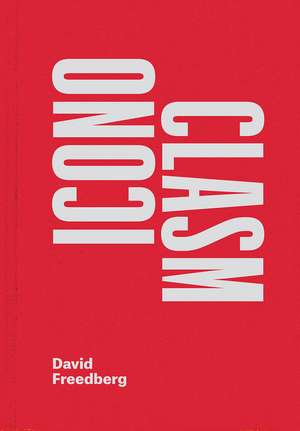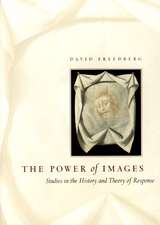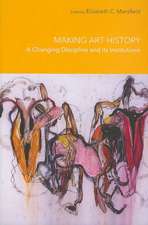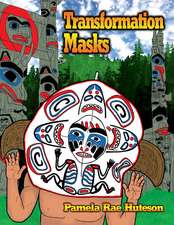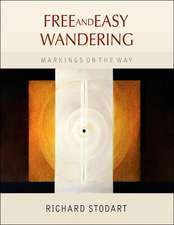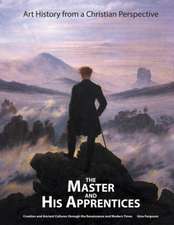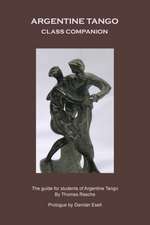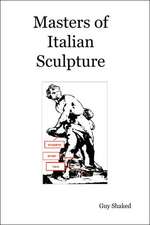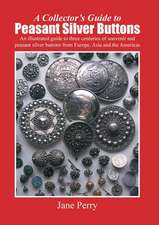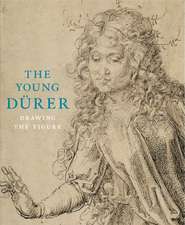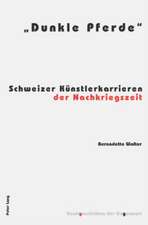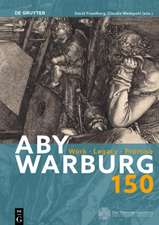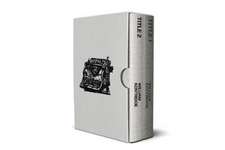Iconoclasm
Autor David Freedbergen Limba Engleză Hardback – 29 iun 2021
Freedberg combines fresh thinking with deep expertise to address the renewed significance of iconoclasm, its ideologies, and its impact. This volume also provides a supplement to Freedberg’s essay on idolatry and iconoclasm from his pathbreaking book, The Power of Images. Freedberg’s writings are of foundational importance to this discussion, and this volume will be a welcome resource for historians, museum professionals, international law specialists, preservationists, and students.
Preț: 300.99 lei
Nou
Puncte Express: 451
Preț estimativ în valută:
57.60€ • 60.56$ • 47.59£
57.60€ • 60.56$ • 47.59£
Carte disponibilă
Livrare economică 27 martie-10 aprilie
Livrare express 12-18 martie pentru 63.07 lei
Preluare comenzi: 021 569.72.76
Specificații
ISBN-13: 9780226445335
ISBN-10: 022644533X
Pagini: 368
Ilustrații: 57 halftones
Dimensiuni: 178 x 254 x 25 mm
Greutate: 1.09 kg
Ediția:First Edition
Editura: University of Chicago Press
Colecția University of Chicago Press
ISBN-10: 022644533X
Pagini: 368
Ilustrații: 57 halftones
Dimensiuni: 178 x 254 x 25 mm
Greutate: 1.09 kg
Ediția:First Edition
Editura: University of Chicago Press
Colecția University of Chicago Press
Notă biografică
David Freedberg is the Pierre Matisse Professor of the history of art at Columbia University and director of the Italian Academy for Advanced Studies in America. He is the author of The Power of Images, which has been translated into many languages, and of the award-winning The Eye of the Lynx. He is a fellow of the American Academy of Arts and Sciences and of the American Philosophical Society as well as of the Accademia Nazionale di Agricultura and the Istituto Veneto di Scienze, Lettere e Arti.
Recenzii
"Most academic art history considers the social and historical contexts of art-making, but Freedberg instead investigates emotional responses we are generally embarrassed to admit even to ourselves. . . . Freedberg argues that those who attack images do so because they find it hard to draw a line between image and reality. For protesters, ‘the broadly political act becomes allied with the idiosyncratic, neurotic one.’ Freedberg sees both iconoclasm and censorship as a way of repressing the irrational fear that an image might truly come alive. If you want to change the meaning of an image or the way it makes people feel or act, he suggests that you encourage people to reflect on their relationship to it."
"Freedberg (Columbia Univ.) has devoted five decades to studying causes for the destruction of images, and this volume collects his essays on the subject, both classic and new. Over the decades, Freedberg's scholarly research has widened from iconoclastic activities in the 16th-century Netherlands to include Byzantine and Reformation practices and, most recently, the Middle East, South Africa, and the Confederate monument debacles in the US. As he weaves together his earlier essays with his most recent analyses, Freedberg confirms that this is not a topic for a single discipline. The complexity of iconoclasm and its ramifications needs to be multidisciplinary and should incorporate religious attitudes, theology, politics, social issues, gender studies, and economics. Every aspect of human activity is in some way affected by or affects iconoclasm, no matter whether it is acknowledged as iconophobia, aniconism, idolatry, or censorship or its motivation is religious, political, or something else. Read in tandem with Freedberg's now-classic The Power of Images (CH, Jan'90, 27-2517), which initiated the vocabulary of response as integral not simply to art history but also to the humanities and social studies, Iconoclasm illuminates the turmoil of contemporary events."
“Freedberg reminds us that the essence of iconoclasm does not consist in a radical refusal of images, as its destructive violence would have us think, but in the awareness of the centrality of images themselves.”
"Iconoclasm feels like a monument to the intellectual testimony of Freedberg. It is the result of a lifelong academic engagement with iconoclasm and art that has been going on for over fifty years. . . . The point that Freedberg convincingly makes throughout this book, that if we want to understand the value of images and art history we need to look at the destruction of art and images, is still as strong and exciting as fifty years ago."
"A highly relevant collection of texts by a specialist in early modern and contemporary destruction of images. From the battles over images in the Reformation to 'cancel culture', Freedberg combines fresh thinking with deep expertise to address the renewed significance of his subject."
“The moment for this book is now. Freedberg shows not just the relationship of past iconoclasm to current debates about what to do with monuments, but reveals the central paradox of our relationship to graven images: we are unable to stop ourselves giving a power and agency to what we know are pieces of stone, wood, or canvas. The deep recognition we find in these inanimate objects is at the root of our need to smash them to halt this recognition. Every example he describes brings new ideas to current questions.”
“Iconoclasm will become not only a classic in art and image destruction scholarship but also a must-read for every scholar interested in the field. Freedberg—the world authority on iconoclasm—questions his beliefs and rethinks what iconoclasm means for images in our current age of digital reproducibility. He draws attention to the relation between images, signs, and bodies, offering a fresh investigation of the role images play in our society.”
“Long before image surpassed word in the battle for our hearts and minds in a virtual world, David Freedberg studied the fascinating, invasive phenomenon of iconoclasm. His visionary work changed the course of art history and visual studies, pointing our attention to our ambiguous relationship to art works, images, and the universal drive to both worship and destroy them. This sample of his very best analyses is nothing less than a must-read for everybody interested in the tremendous power of images and iconoclasm, from antiquity till now. Combining impressively broad scholarship with amazing writing, this book is literally an eye-opener.”
